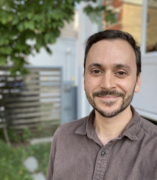
Matthew Kendall, PhD
Assistant Professor
Polish, Russian, and Lithuanian Studies
Pronouns: He/Him/His
Contact
Building & Room:
1602 UH
Address:
601 S. Morgan St.
Office Phone:
Email:
CV Download:
Related Sites:
About
Research & Teaching Interests:
Film & Media history and theory; Soviet literature; Documentary modes; Sound studies; Gender and sexuality in Soviet space
Selected Publications
“Room for Noise in Soviet Sound Recording” Slavic Review, Volume 82, Issue 4, Winter 2023, pp. 865-873 (link)
“Introduction” to Soviet Sound Worlds Critical Discussion Forum (w/ Gabrielle Cornish). Slavic Review, Volume 82, Issue 4, Winter 2023, pp. 859-864 (link)
“Reading” Pathologic 2: Russian Literature as a Trans-Medial Idea” Russian Literature, Vol 138–139 (2023), pp. 193-215 (link)
“Boisterous Utopia: Soviet Sonic Culture and Dziga Vertov’s Enthusiasm” Russian Review 81:3 (July 2022), pp. 528-548 (link)
“Stereoscopic Realism: Aleksandr Andrievskii’s Engineers of Illusion” [Стереоскопический реализм: Инженеры иллюзий Александра Андриевского] in Non-standard: Forgotten Experiments in Russian Culture, 1934-64 [НестандАрт: Забытые эксперименты в русской культуре, 1934-64], pp. 79-93. Moscow: NLO, 2021.
Reviews
Film Review: Svetlana Samoshina, The Edge of the Broken Moon (2022), in KinoKultura #83 (April 2024) (link)
Review of Recording Russia: Trying to Listen in the 19th Century (Gabriella Safran, Cornell UP, 2022) in Russian Review 82:2 (April 2023), pp. 327-328 (link)
Review of Arctic Cinemas and the Documentary Ethos (Indiana UP, 2019) in Slavic and East European Journal 64(3): pp.546-547, Fall 2020 (link)
Education
Ph.D., Slavic Languages and Literatures - University of California, Berkeley, (2019)
M.A., Slavic Languages and Literatures - University of California, Berkeley, (2014)
B.A., Russian - Reed College, (2010)
Research Currently in Progress
I am currently at work on a book-length project, Revolutions per Minute, which offers a cultural history of sound recording in the first half of the Soviet Union and Late Russian Empire. The book uses the technology of sound recording to trace how listening was framed a socially, historically, and culturally mediated act, and offers a history of sound recording’s impact on artists in the Soviet Union. At its core, the book argues that mechanical sound recording significantly changed the expression and perception of four crucial concepts for the reception and interpretation of literature and cinema in the Soviet Union: authorship, attention, archive, and representation. More specifically, this means that sound recording challenged the human-centric idea of an author, and changed attitudes concerning any author’s privilege to claim ownership; it re-taught its listeners which sonic details required their attention, and thus re-calibrated their appreciation of sonic significance both in everyday life and their aesthetic encounters; it re-organized personal habits and institutional practices dedicated to the preservation of past and future by promising a new, synthetic form of memory; finally, it allowed for the production and performance of new social types within popular forms of media.